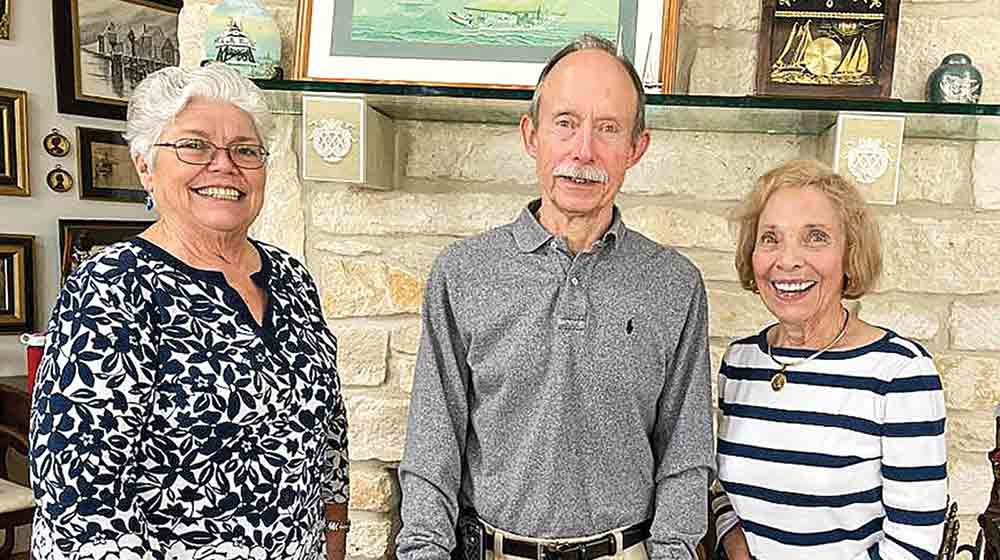AAUW hears about mental health
 George Wood with the Lake Livingston Area Mental Health Initiative recently presented a program to the Polk County Chapter of the American Association of University Women (AAUW) during its February meeting which was held in the home of Jo Mink. Wood is a master mental health coach, team leader and addiction and recovery specialist. (l-r) AAUW President Virginia Key, Wood and Mink. Courtesy photo
George Wood with the Lake Livingston Area Mental Health Initiative recently presented a program to the Polk County Chapter of the American Association of University Women (AAUW) during its February meeting which was held in the home of Jo Mink. Wood is a master mental health coach, team leader and addiction and recovery specialist. (l-r) AAUW President Virginia Key, Wood and Mink. Courtesy photo
By Emily Banks Wooten
This email address is being protected from spambots. You need JavaScript enabled to view it.
George Wood with the Lake Livingston Area Mental Health Initiative recently presented a program to the Polk County Chapter of the American Association of University Women (AAUW). Wood is a master mental health coach, team leader and addiction and recovery specialist.
Wood explained that a mental health disorder or mental illness is a diagnosable illness that affects a person’s thinking, emotional state and behavior and disrupts the person’s ability to work or carry out other daily activities and engage in satisfying personal relationships.
However, a mental health problem is a broader term that includes both mental disorders and symptoms of mental disorders that may not be severe enough to warrant the diagnosis of a mental disorder, he said.
Wood reviewed some of the opportunities offered locally by the Lake Livingston Area Mental Health Initiative.
There is a Live Strong Support Group that meets at 6 p.m. weekly, every Tuesday at St. Luke’s Episcopal Church at 836 W. Jones in Livingston. He said it is a free, open group for anyone needing help with mental distress or illness. The team is led by experienced mental health professionals and welcomes adults of any age or faith, or no faith. He said the group is for mutual support, not therapy or counseling. For additional information, call 936-327-8467 or just show up at the meeting.
There is a Minds Transformed Support Group that meets at 6 p.m. weekly, every Thursday at St. Luke’s Episcopal Church at 836 W. Jones in Livingston. Another free, open group, it is here to help individuals living with mental difficulties, hold one another up and give each person practical skills and tools to regain more control of their lives and rebuild their families. While prayer and Bible readings are used as part of each session, participants don’t need to be any particular denomination, or go to church, or even believe in God to get a benefit from the program, Wood said.
“Everyone is on their own spiritual journey – there is no judgment here. We believe that recovery is possible and we will focus on the positive,” he said. Call 936-327-8467 for more information or just show up at the meeting.
Finally, there is the Families Transformed Support Group, a 16-week faith-based support group for families of those living with a mental health difficulty that provides practical tools and skills within a supportive community. This group alternates with Minds Transformed at 6 p.m. every Thursday.
Additionally, an Adult Mental Health First Aid Class will be offered at no cost from 8:15 a.m. to 5 p.m. on April 22 at St. Luke’s Episcopal Church at 836 W. Jones in Livingston. Lunch will be provided. Call 936-327-8467 to register.
Wood reported that 21% of adults – the equivalent to over 50 million Americans – are experiencing a mental illness and that 55% of adults with a mental illness (over 28 million individuals) receive no treatment. He reported that 60% of youth with major depression do not receive mental health treatment. In the U.S. there are 350 individuals for every one mental health provider, he said.
Using data from the National Alliance on Mental Illness (NAMI), Wood illustrated the ripple effect of mental illness on the individual, their family, the community and the world. He said people with mental illness have an increased risk for chronic disease like diabetes or cancer, 18% of U.S. adults with mental illness also have a substance use disorder and that the rates of cardiometabolic disease are twice as high in adults with serious mental illness.
The data shows that at least 8.4 million Americans provide care to an adult with an emotional or mental illness and that caregivers spend an average of 32 hours per week providing unpaid care.
Community-wise, the NAMI data reflects 21% of people experiencing homelessness also have a serious mental illness, 37% of people incarcerated in state and federal prison have a diagnosed mental condition, 70% of youth in the juvenile justice system have at least one mental health condition and that one in eight of all visits to U.S. emergency rooms are related to mental and substance use disorders.
Wood said that depression is a leading cause of disability worldwide and that depression and anxiety disorders cost the global economy $1 trillion each year in lost productivity.
You are a guest
or post as a guest
Be the first to comment.

